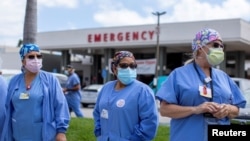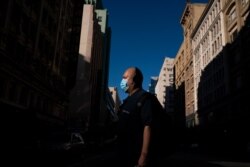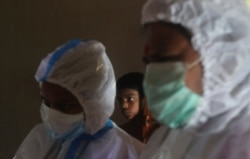The number of COVID-19 cases around the world continues its steady climb with more than 19.2 million infections, according to Johns Hopkins University. The U.S. continues to have more cases than anywhere else with more than 4.9 million, followed by Brazil with nearly 3 million and India with 2 million.
New York Gov. Andrew Cuomo said Friday he would allow students in the state to return to classrooms at the beginning of the school year because of success in curbing the coronavirus.
Cuomo’s decision will allow students to attend some in-person classes while wearing masks, while also being able to learn online remotely the rest of the time.
Large U.S. cities such as Chicago, Houston, Los Angeles and Miami are among the areas that will start the school year with students learning remotely.
A high school in the southern U.S. state of Georgia lifted the suspension of at least one student who posted a photograph online of a crowded school hallway, showing most of the students not wearing masks. The student was suspended earlier in the week for posting the photo, but the action was reversed after widespread media coverage of the incident.
Dr. Harry Heiman, a clinical associate professor at Georgia State University’s School of Public Health, told the Atlanta Journal-Constitution newspaper after seeing the photograph that “it’s not a question of if that’s going to cause spread of the pandemic. It’s only a question of how quickly and to how many people.”
Superintendent Brian Otott said the school staff had worked hard to create a safe return for the students. He said most of the school’s hallways were one-way; in the hallway in the photograph students were moving in both directions to cut down on travel time between classes. Students and staff are not required to wear masks at the school.
The top U.S. infectious disease expert says the world will never be able to eradicate the coronavirus, but he is hopeful hundreds of millions of doses of vaccine could be available by the end of this year.
“There will be, I think, enough vaccine if everything turns out to be successful,” Dr. Anthony Fauci told VOA contributor Greta Van Susteren. “To get vaccine not only to the countries that are the classical rich countries but those who are low and middle income that would not be able to readily have access to a vaccine. That's what we're hoping to do.”
But Fauci has said in the past that there's no guarantee a vaccine will give long-term protection against COVID-19 since it is a new coronavirus and scientists are still learning about it.
In a separate interview with Reuters, Fauci said the reason the virus will never go away is because of its “highly transmissible” nature. But he said with “the combination of a good vaccine and attention to public health measures ... then I think we can get behind this.”
According to Johns Hopkins University, there have been more than 161,000 deaths from COVID-19 in the United States.
Elsewhere
In France, the number of coronavirus cases reported Friday rose by 2,288, a new post-lockdown high.
Cases also rose Friday in Spain, which registered 1,895 new coronavirus infections, mainly in the regions of the Basque Country, Catalonia and Aragon.
The World Bank on Friday approved $114 million to help Nigeria tackle its coronavirus pandemic. Africa's most populous country has recorded more than 45,000 confirmed coronavirus cases and 930 deaths.
On Thursday, the U.S. State Department and the federal Centers for Disease Control and Prevention lifted the recommendation to Americans to avoid all global travel and replaced it with a number of high-level warnings against heading to individual nations.
“With health and safety conditions improving in some countries and potentially deteriorating in others, the department is returning to our previous system of country-specific levels of travel advice,” the State Department said.
Thirty countries are on the Level Four “Do Not Travel” list, including India, Russia, Egypt, Libya, Honduras, Kazakhstan, and Mexico.
Mexican President Andres Manual Lopez Obrador responded to the U.S. decision to leave his country on the list, telling reporters Friday that Mexico, which ranks sixth worldwide in infections with more than 462,000, has “many fewer problems with the pandemic” than the U.S. He added: “Our situation is better.”







